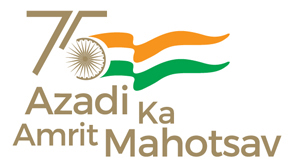November 2016
Summary of 5th Annual Coordination Meeting of the UNESCO World Heritage related Category 2 Institutes and Centres on 22nd November 2016
|
The 5th Annual Coordination Meeting of the UNESCO World Heritage related Category 2 Institutes and Centres took place in Dehradun, India on 22 November, 2016. The UNESCO Category 2 Centre (C2C) on Natural World Heritage Management and Training for Asia and the Pacific Region (NWHMT) at the Wildlife Institute of India (WII) hosted the meeting in its campus. Four Coordination Meetings have taken place so far in 2010 (Manama, Bahrain), 2012 (Milan, Italy), 2013 (Oslo, Norway) and 2014 (Shanghai, China). The objective of this meeting was to build institutional capacity through a focus on international cooperation and to build synergies for effective natural heritage conservation. 19 representatives from the UNESCO World Heritage Centre, Advisory Bodies, Regional Institutes and Universities, UNESCO Chairs and four Category 2 Centres participated in the meeting. Dr. V.B. Mathur, Director UNESCO C2C at WII welcomed the participants and briefed about the purpose of the 5th Annual Coordination Meeting and also gave an overview of mandate and activities of the newly established C2C at WII. In her inaugural address, Dr. Mechtild Rossler, Director World Heritage Centre, Paris highlighted the role of World Heritage Category 2 Centres in complementing the work of UNESCO. The meeting was organized in three technical sessions in which review of actions taken from previous C2C coordination meetings; progress and activities of each Category 2 Centre and Institutes and road map for enhancing collaborations and cooperation amongst C2Cs was discussed. The UNESCO C2C at WII Monsoon bulletin was also launched during this meeting and is available on the following website link http://www.wii.gov.in/UNESCO_C2C_Monsoon_Bulletin_2016. The 5th Annual Coordination Meeting was followed by two Consultative Dialogues on “Kailash Sacred Landscape” and “Cultural Landscapes, Mixed and Transboundary Heritage Sites” on 23rd November and 24th -25thNovember, 2016 respectively in which over 100 representatives from UNESCO, IUCN, ICOMOS, INTACH and State Forest Departments, Universities participated. |
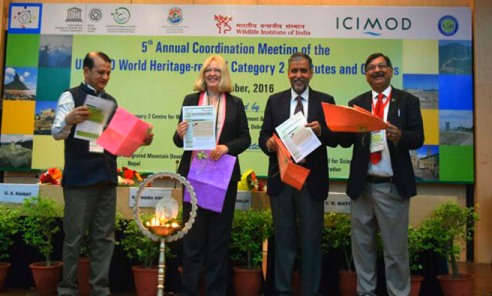 |
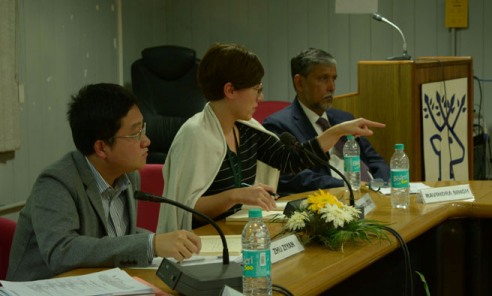 |
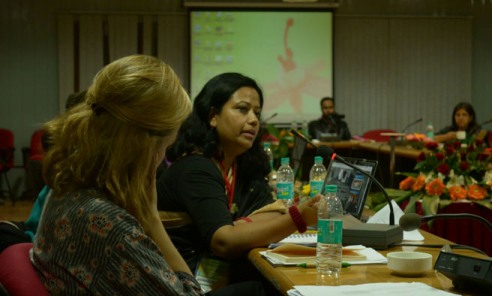 |
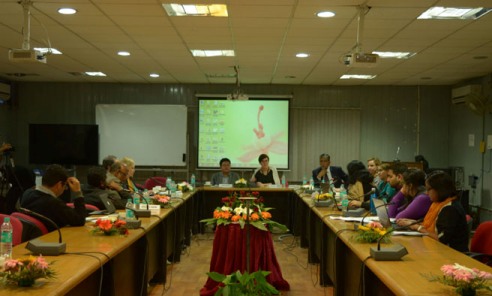 |
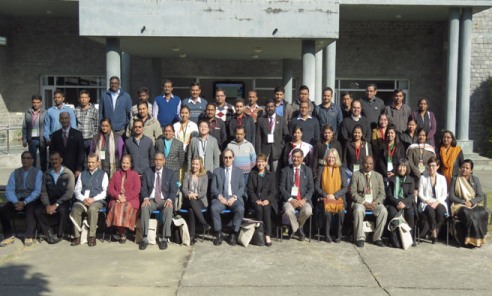 |
Last Updated: November 24, 2016
UNESCO C2C Natural Heritage Bulletin Monsoon - 2016
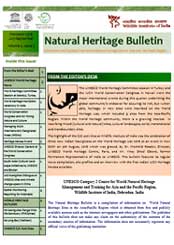 |
| UNESCO C2C Natural Heritage Bulletin Monsoon - 2016 Download E-Bulletin  (2.9 mb) (2.9 mb) |
Last Updated: November 24, 2016
Asian Ministerial Conference on Disaster Risk Reduction, November 3-5, 2016
This First Asian Ministerial Conference for Disaster Risk Reduction (AMCDRR) after the advent of the Sendai Framework was hosted by the Government of India from 3rd -5th November 2016. The intended outcome of the conference was to adopt as ‘Asian Regional Plan for Implementation of the Sendai Framework’. The conference provided a unique opportunity to shape the implementation and monitoring of the Sendai Framework in Asia by transforming the commitment of governments and stakeholders into national and local action and setting the direction to accelerate regional implementation and monitoring of the Sendai Framework.
In AMCDRR 2016, UNESCO Category 2 Centre on World Natural Heritage Management and Training for Asia and the Pacific Region at Wildlife Institute of India, Dehradun organised a thematic session on ‘Making World Heritage Risk Resilient’ along with Tata Institute of Social Sciences (TISS) - Jamsetji Tata school of Disaster Management and Development & Research Organization for Arts and Natural Heritage (DRONAH) as collaborators. The objective was to influence policy and action for better management and protection of Natural and Cultural World Heritage Sites for Disaster Risk Reduction and to interact and provide a knowledge platform for promoting DRR solutions through World Heritage Sites to policy makers and practitioners in Asia-Pacific Region.
This thematic session emphasised the need for countries to develop concerted policies and plans on disaster risk reduction for World Heritage Sites and also to examine how world heritage conservation could foster resilience. It brought together experts from both natural and cultural heritage areas who reflected on the current situation, the potential threats and consequences and also helped to identify the way ahead in terms of appropriate frameworks, existing practices and protocols, policies and perhaps trainings that will be required to enhance sensitivity of the many actors involved in creating robust DRR strategies for world heritage sites in the Asian region.
The outputs from the session were development of a framework for integration of Natural and Cultural heritage conservation concerns into Regional disaster reduction policies; and mainstreaming of disaster risk reduction within management plans and systems for World Heritage properties in their territories.
The session was moderated by Dr. Sonali Ghosh, Scientist and Faculty UNESCO C2C, which included 3 key speakers viz. Shri Vinay Sheel Oberai, Secretary, MoHRD, Dr. V.B. Mathur, Director, UNESCO C2C & Wildlife Institute of India and Dr. Mitrasen Bhikajee, Deputy Director, UNESCO, New Delhi and 12 panellists viz. Dr. Janki Andharia, TISS, Mumbai, Dr. Shikha Jain, DRONAH, Ms. Vanicka Arora, NDMA, Prof. Dr. Sudibyakto, Advisory Board of BNPB (Indonesia), Mr. Anshuman Saikia, Regional Programme Support Coordinator, IUCN Asia, Mr. Jeremy England, President International Committee of the Red Cross-India, Dr. Navin Piplani, Principal Director, INTACH, Ms Margherita Fanchiotti, UNESCO, Dr. Shirish Ravan, UNOOSA and Dr. Ram Boojh, Programme Specialist, Natural Science, UNESCO.
The whole session can be viewed on You Tube link: https://www.youtube.com/watch?v=HRi9qoftCUs
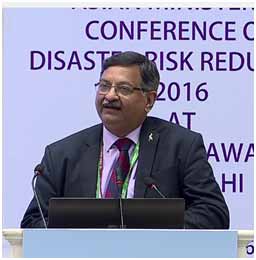 |
|
Director, UNESCO Category 2 Centre-WII on Natural WHS and DRR |
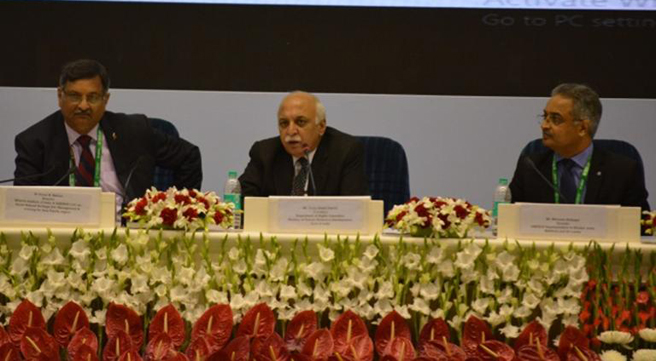 |
|
Shri V.S. Oberoi, Chair of the session addressing the audience |
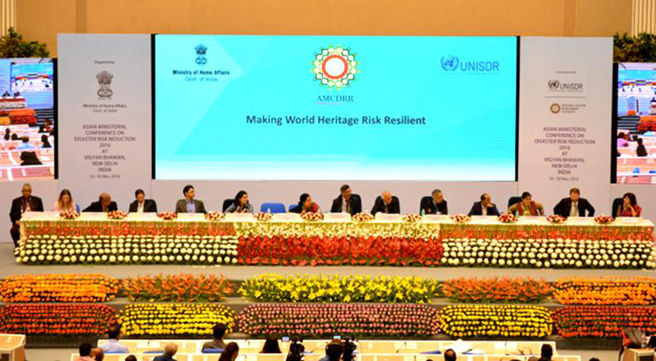 |
|
Keynote Speaker and Panel Discussants |
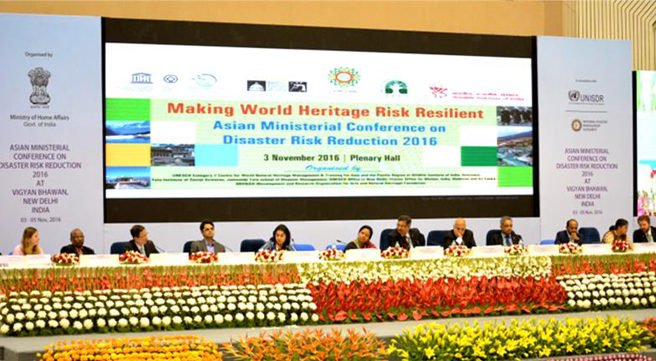 |
| Panel Discussant participating in the discussion |
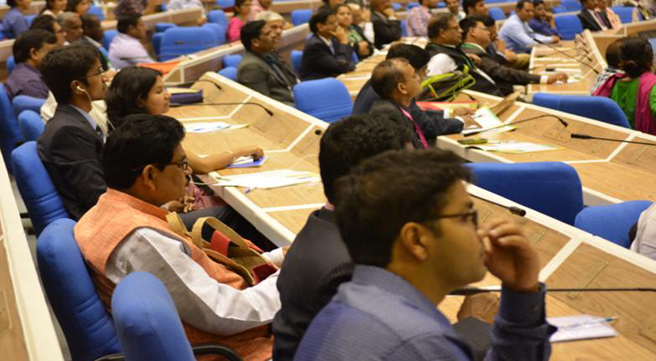 |
|
Audience during the session |
Last Updated: November 18, 2016
Second Training Expedition on ‘Coastal and Marine Biodiversity and Protected Area Management in Gujarat’, 24-26 October, 2016 at Jamnagar, Gujarat
Conservation and Sustainable Management of Coastal and Marine Protected Areas (CMPA)” project of the Indo-German Biodiversity Programme of GIZ aims at strengthening capacities of key training and learning organizations relevant to Marine Protected Areas (MPAs). In this context, a “Special Training Expedition on Coastal and Marine Biodiversity and Protected Area Management” for field-level staff of the Gujarat Forest Department was organized on 24-26 October, 2016 at Jamnagar, in Gujarat. This program was jointly organized by the Wildlife Institute of India and Deutsche Gesellschaft für Internationale Zusammenarbeit (GIZ) GmbH, CAMPA-Dugong Project and Gujarat Forest Department. This course was intended to enable the participants to have a sound understanding of the concepts and issues related to managing coastal and marine biodiversity, coastal and marine protected areas, ecological and socio-political context, conservation approaches and legal-policy framework between terrestrial and coastal marine PAs, as well as to acquire necessary skills to conduct assessment and monitoring of coastal and marine habitats and species and prepare field reports, and develop-under supervision-operational plan for MPAs based on management effectiveness guidelines. A total of 18 participants from the Gujarat Forest Department have participated in this training expedition. The course curriculum and training methodologies that have been developed exclusively for this course. For further details, contact the Course Director Dr. K. Sivakumar at ksivakumar [at] wii [dot] gov [dot] in.
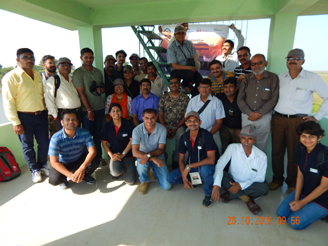 |
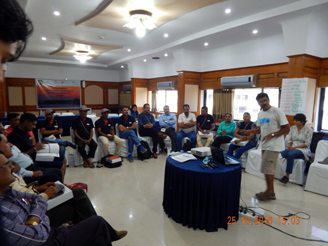 |
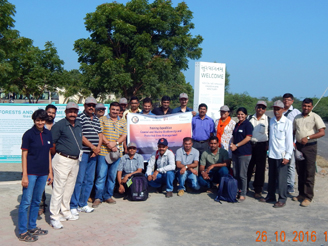 |
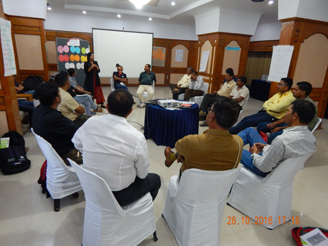 |
Last Updated: January 6, 2018

